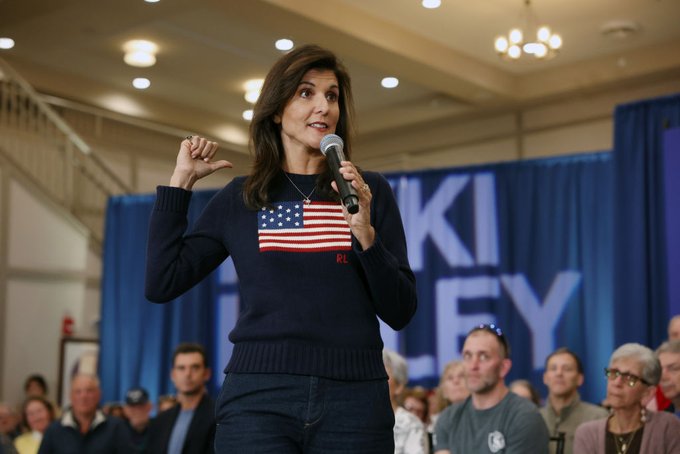Nikki Haley recalls facing racism as daughter of Indian immigrants

Indian American presidential contender warns Republicans against renominating Donald Trump
A week and a half from the Iowa caucuses, two Republican presidential contenders — Indian American Nikki Haley and Florida Gov. Ron DeSantis warned that nominating Donald Trump again could cost them the White House in November.
In back-to-back town halls on CNN Thursday night, a resurgent Haley and DeSantis sought to convince voters that they were a better bet than the former president who is more than 30 points ahead of them in Iowa.
The two also made their cases that Trump’s legal battles could hurt the party’s efforts to defeat President Joe Biden in the general election.
READ: Nikki Haley emerges as Donald Trump’s main rival (October 5, 2023)
Next week, for the first time, Haley and DeSantis will debate each other, again on CNN, without any other rivals onstage.
Haley sought to demonstrate that she was ready and tough enough to deal with hard issues. She emphasized fiscal responsibility and argued that Israel should get whatever it needs from the United States to fight Hamas.
She also described the approach she took to remove the Confederate flag from the grounds of the South Carolina statehouse when she was governor.
“You are going to see me fight until the very end, on the last day in Iowa,” she said. “And I’m not playing in one state. I’m fighting in every state. Because I think everybody’s worth fighting for.”
READ: Vivek Ramaswamy, Nikki Haley forge ahead of Ron DeSantis (September 21, 2023)
Haley had one of the worst weeks of her campaign last week after she failed to mention slavery when asked about what caused the Civil War. Asked about it, Thursday Haley repeated that she thought it was a given.
“I should have said slavery right off the bat, but if you grow up in South Carolina, literally in second and third grade, you learn about slavery,” she said.
“I was thinking past slavery, and talking about the lesson that we would learn going forward. I shouldn’t have done that.”
Haley was also asked to share what discussions about slavery looked like when she was growing up and her own history dealing with racism.
READ: Nikki Haley says she’s running against Kamala Harris (September 20, 2023)
In past interviews and her memoir, Haley has described several racist incidents she and her parents, who are Indian immigrants, experienced after moving to their rural South Carolina hometown.
“We dealt with our own challenges,” she said. “I remember when I would get teased on the playground, and I would come home. My mom would always say, ‘Your job is not to show them how you’re different, your job is to show them how you’re similar.’”
She also discussed how she handled two pivotal moments of her governorship – the fatal police shooting of Walter Scott and the White supremacist shooting at Emanuel AME Church.
After the shooting of Scott, a Black man, Haley signed police body camera legislation. After the church attack, she called for the Confederate battle flag to be removed from the statehouse grounds.
Haley said South Carolina was about to avoid “riots and protests” after the Emanuel AME Church shooting because she realized that half of the state saw the flag as a “heritage and tradition” and half saw it as “slavery and hate.”
“My job wasn’t to judge either side,” she said. “My job was to get them to see the best of themselves and go forward.”
Thursday’s town hall took place hours after a school shooting in Perry, Iowa in which a middle school student was killed and five others were injured.
Asked how, in light of the attack, she would address the issue of gun violence at schools without limiting gun rights, Haley focused her answer on mental health and security.
“We have got to deal with the cancer that is mental health,” she said. The country doesn’t have enough mental health therapists, mental health centers and addiction centers, and insurance sometimes doesn’t cover treatment, she said.
Haley also called for securing schools the way the country secures airports and courthouses.
Asked if she supports any restrictions on guns, Haley said she is a concealed weapons permit holder and doesn’t support restricting people’s ability to protect themselves.
“We could go and take away a certain kind of gun today, and that would make you feel better today. But a week from now, there’d be another shooting,” she said.
“Instead, why don’t we do the hard work and deal with the mental health? If we start to do that, I know that we will see a reduction in what’s happening.”

